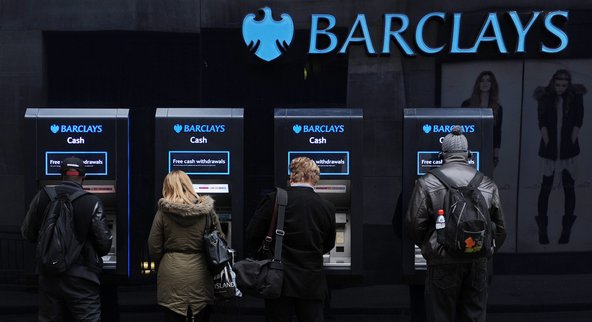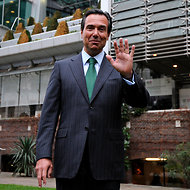The president of Bank of Cyprus, the nation’s largest bank, was fired Wednesday by the central bank in consultation with the international lenders who are finalizing the terms of a €10 billion, or $13 billion, bailout of the heavily indebted country.
Meanwhile, President Nicos Anastasiades opened a criminal investigation into how the nation’s banks had been brought to the brink of collapse. His aim, he said, was “to find and attribute responsibility wherever it belongs.”
Tensions have intensified in Nicosia, the capital, in recent days as citizens, confronted with banks that have been closed for almost two weeks, have grown impatient waiting for the bailout deal to be finalized so that they can get access to their money. Many are also angry at what they see as Mr. Anastasiades’s inept political handling of the situation.
Demonstrations that first attracted hundreds here last week have been swelling into increasingly agitated gatherings of thousands of people amid the dawning realization that their future under the terms of the bailout deal will become increasingly bleak.
At the same time, a blame game has escalated among the ruling class. Mr. Anastasiades has started making incendiary statements about the central bank president, Panicos O. Demetriades, hinting strongly that he wants to see Mr. Demetriades ousted. That, in turn, has raised concerns about the central bank’s independence.
“The knives are out,” said a person involved in the talks, who declined to speak publicly because the talks were private.
Attention focused Wednesday on capital controls, without which the banks in Cyprus cannot open as planned on Thursday. The banks have been closed since March 16 to prevent a bank run while bailout talks were under way.
The Cypriot finance minister, Michalis Sarris, said Wednesday that a flood of withdrawals was bound to happen quickly, and that the restrictions would at least help stem a mass flight of deposits.
“Each day that banks remain closed creates more uncertainty and more difficulties for people, so we would like to do our utmost to make sure that this new goal that we have set will work,” he said.
Under European Union treaties, restricting the free movement of capital is forbidden. Critics say that what is happening in Cyprus shows that E.U. rules will be flouted when the International Monetary Fund, the European Central Bank and E.U. leaders find it convenient to do so.
The person involved in the forging the details of how capital controls will be implemented in Cyprus acknowledged Wednesday that this simply should not be happening. But “if you did not have them, then probably 100 percent of deposits would fly out of the country,” said the person.
Nonresident depositors, including Russians and businesses with substantial amounts in Cypriot banks, are especially eager to get their money out, the person said.
Authorities are bracing for as much as 10 percent of the €64 billion in deposits in Cypriot banks to be pulled out when banks reopen Thursday, the person said, adding that restrictions could be tightened further if necessary.
Faith in Cyprus’s banks has been severely undermined, not only because Mr. Anastasiades and E.U. leaders introduced the idea of skimming savers’ accounts to pay for the bailout, but also because authorities have prolonged bank closures for such a long time.
If Bank of Cyprus does not reopen for some reason on Thursday, “it will create a self-fulfilling prophecy that we have a problem that can’t be resolved,” the person said.
Instability has gripped Bank of Cyprus in recent days. The central bank has essentially directed every step the private bank must take since Cyprus’s creditors demanded that the nation’s second-largest bank, Cyprus Popular Bank, fold and move a large number of accounts to Bank of Cyprus.
The Bank of Cyprus chief executive, Yiannis Kypri, has protested what he called central bank interference with a private company and tendered his resignation Tuesday, a move that was rejected by the bank’s board.
But on Wednesday, the central bank chief, Mr. Demetriades, forced out Mr. Kypri and the entire Bank of Cyprus board in a joint decision with international lenders as part of the legal moves required for that bank to be consolidated.
On Tuesday a huge crowd gathered in front of Bank of Cyprus, shouting angrily about the devastation that the recent measures would wreak on jobs and the economy. The crowd then headed to the central bank to demand the resignation of Mr. Demetriades, whom many see as handling the situation with an iron fist.
By imposing capital controls, European and Cypriot officials have effectively created two classes of euro — a good and a bad. If a depositor has €1 million in a Cypriot bank but cannot access it or take it to another country, then the money is effectively worthless, since it cannot be spent in Cyprus or abroad.
“It has to be acknowledged that this is something entirely new,” said Nicolas Véron, a senior fellow at Bruegel, a research concern in Brussels, and a visiting fellow at the Peterson Institute for International Economics in Washington.
“The question is, Can the euro zone survive capital controls?” Mr. Véron said. “This will shape expectations in other countries, and the issue is whether capital controls can be avoided in future episodes.”
Article source: http://www.nytimes.com/2013/03/28/business/global/tensions-escalate-in-cyprus-as-banks-prepare-to-reopen.html?partner=rss&emc=rss


